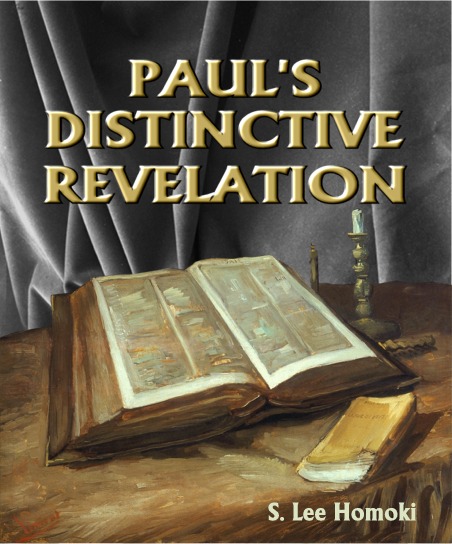Description
The title explains itself. The Lord gave a unique revelation to Paul. Give this to others so that they can come to that understanding as well. Comes in a pack of 10.
MESSAGE:
The Bible clearly states that there are divisions in Scripture which must be observed if we are ever going to acquire a proper interpretation of Scripture and if we are going to be unashamed workmen (2 Tim. 2:15).
The fact that there are divisions in Scripture points to the reality of progressive revelation. Progressive revelation is the progressive unfolding of divine truth. Progressive revelation means that God added more and more meaning and gave new light and concepts of His plan and purpose as the ages of time advanced, in some cases superseding previously given revelation as a primary source of information.
An often overlooked division in Scripture and advance on truth is the Pauline Revelation, which the Apostle Paul called “my gospel.” The Apostle Paul received a revelation that is a distinctive advance on truth. Let’s investigate the truth of Paul’s Distinctive Revelation.
(1) Paul’s gospel was received by special revelation (Acts 26:16‑19; Eph. 3:3) in the desert of Arabia (cf., Gal. 1:12,17 w/4:25). Please observe that both Moses and Christ had, no doubt, also been taught there (Ex. 19; Mt. 4:1; Lk. 1:80).
(2) Paul’s gospel had never been revealed before to anyone but him (cf., Rom. 16:25; 1 Cor. 9:17 w/ Gal. 3:23; Eph. 3:5–9; Col. 1:25‑26; 1 Tim. 1:16). This is why it is referred to as “the Mystery” (Eph. 3:3‑4), and this is why Paul referred to it as “my gospel” (Rom. 2:16; 16:25; 2 Tim. 2:8). Please observe in Ephesians 3:1‑8 the numerous times the personal pronouns “I” and “me” are used. Paul had personally received this revelation from Jesus Christ (Gal. 1:12). He in turn revealed it to the “holy apostles and prophets by the Spirit” (cf., Eph. 3:5 w/ Gal. 2:2).
(3) Paul’s gospel was the new Dispensation of the Grace of God (1 Cor. 9:17; Eph. 3:2; Col. 1:25). The Dispensation of the Grace of God stands in contrast to the other dispensations of Innocence, Conscience, Human Government, Law, and Kingdom.
(4) Paul’s gospel makes many new advances on truth which cannot be found anywhere else in the Bible.
Some examples:
(a) The Church which is the Body of Christ (Eph. 5:30‑32);
(b) Believer’s union with Christ and union with other believers in the Body (Rom. 12; 1 Cor. 12; Eph. 4:1);
(c) Baptism by the Holy Spirit (1 Cor. 12:12‑13; Eph. 2:18);
(d) The Heavenly standing of Body believers (Eph. 1:3; 2:6);
(e) Rapture of the Body of Christ (1 Thess. 4:16‑17);
(f) The mystery of resurrection transformation (1 Cor. 15);
(g) The mystery concerning the length of Israel’s blindness (Rom. 11:25);
(h) The termination of some spiritual gifts (cf., 1 Cor. 13:8 w/Eph. 4:11‑12).
If you take the Pauline Epistles out of the Bible, then you are left without any Church‑Age doctrine.
(5) Paul is the first preacher of this gospel (1 Tim. 2:7; 2 Tim. 1:11). The late William R. Newell, of the Moody Bible Institute, in his fine book “Paul Versus Peter,” page 23, makes the following comment on 2 Timothy 1:11:
“The Greek word here is KERUX, which means an advance herald, that is, one that announces something new, ahead of others.”
(6) Paul’s gospel was not an extension of the Gospel of the Kingdom. The Kingdom Gospel is the “Gospel of the Circumcision,” but Paul’s gospel was the “Gospel of the Uncircumcision” (Gal. 2:7).
(7) Paul did not receive his gospel from the Jerusalem (Twelve) Apostles or from anyone else (Gal. 1:11‑12,16–17).
(8) Paul was not accountable to the Jerusalem (Twelve) Apostles (Gal. 2:2). Please note that when he went to Jerusalem, he went by revelation, not by command.
(9) Paul taught the Jerusalem (Twelve) Apostles “that gospel” which he preached (Gal. 2:2). This would not have been necessary if his message had been identical with what the Jerusalem Apostles had been preaching. They were not able to teach Paul (Gal. 2:6).
(10) Paul’s gospel superseded all other forms of the gospel (1 Cor. 4:16; 11:1; Gal. 1:8; Phil. 3:17; 2 Tim. 1:11‑13; 2:2). At this point it would be well to check out Dr. C.I. Scofield’s com-ments on the different forms of the gospel (see Old Scofield Bible, page 1343.)
(11) Paul’s gospel has an inherent three-fold commission in it. Church‑Age believers are responsible to God to evangelize the lost: the ministry of reconciliation (Acts 26:18; 2 Cor. 5:18‑21; Eph. 3:8), to be custodians of the Mystery (1 Cor. 4:1; Eph. 3:9), and to glorify God (Eph. 1:6; 3:9‑11; Phil. 1:20). Paul was a faithful example of how this responsibility ought to be executed (Acts 26 :19; 2 Tim. 4:7).
(12) Paul’s gospel was not endorsed at the beginning (2 Tim. 4:16) and brought him much persecution (Eph. 6:19‑20; Col. 4:3; 1 Tim.1:8‑12; 2 Tim. 3:10‑4:2). Many of the Kingdom believers could not understand salvation apart from the demands of the covenants and constantly “dogged” Paul’s footsteps, insisting that he con-form to this legal standard (Acts 15:1‑2; Gal. 2:12-14) .
(13) Paul’s gospel must be preached everywhere (2 Cor. 5:18‑21; Eph. 6:19‑20; Phil. 3:9,17; Col. 4:3; 1 Tim. 1:11,16,18; 2 Tim. 2:2; 1 Thess. 2:4; Titus 2:1,15).
Failure or refusal to discern Paul’s gospel as a separate and new revelation ‑ not merely an extension of Israel’s Kingdom Gospel ‑ accounts for most of the confusion in people’s minds as to just what the gospel is and just what is the normal Christian life. William R. Newell, on page 6 of the above‑mentioned book, makes the following fantastically pointed and important statement:
“You can judge any man’s preaching or teaching by this rule: Is he Pauline? Does his doctrine start and finish according to those statements of Christian doctrine uttered by the Apostle Paul?
“No matter how wonderful a man may seem in his gifts and apparent consecration, if his gospel is not Pauline, it is not the gospel, and we might as well get our minds settled at once as to that.”
Let me ask you this: “Are you saved? Do you know Jesus Christ as your personal Savior?” The Bible says we are sinners by birth, not by choice. “There is none righteous, no, not one..For all have sinned and come short of the glory of God” (Rom. 3:10 & 23). “For the wages [penalty] of sin is death, but the gift of God is eternal life through Jesus Christ our Lord” (Rom. 6:23).
Believe the Good News! “…God commendeth His love toward us, in that, while we were yet sinners, Christ died for us” (Rom. 5:8). “For by grace are you saved through faith; and that not of yourselves, it is the gift of God: not of works, lest any man should boast (Eph. 2:8-9). Christ died [on the Cross] for you; He was buried for you; He arose for you (1 Cor. 15:1-4). Why not accept His free gift of salvation by putting your faith and trust in His finished work on the Cross of Calvary? “Believe on the Lord Jesus Christ, and YOU WILL be saved” (Acts 4:12).




